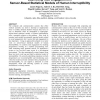Free Online Productivity Tools
i2Speak
i2Symbol
i2OCR
iTex2Img
iWeb2Print
iWeb2Shot
i2Type
iPdf2Split
iPdf2Merge
i2Bopomofo
i2Arabic
i2Style
i2Image
i2PDF
iLatex2Rtf
Sci2ools
113
click to vote
CHI
2005
ACM
2005
ACM
Examining task engagement in sensor-based statistical models of human interruptibility
The computer and communication systems that office workers currently use tend to interrupt at inappropriate times or unduly demand attention because they have no way to determine when an interruption is appropriate. Sensor-based statistical models of human interruptibility offer a potential solution to this problem. Prior work to examine such models has primarily reported results related to social engagement, but it seems that task engagement is also important. Using an approach developed in our prior work on sensor-based statistical models of human interruptibility, we examine task engagement by studying programmers working on a realistic programming task. After examining many potential sensors, we implement a system to log low-level input events in a development environment. We then automatically extract features from these low-level event logs and build a statistical model of interruptibility. By correctly identifying situations in which programmers are non-interruptible and minimi...
CHI 2005 | Human Computer Interaction | Sensor-based Interfaces | Sensor-based Statistical Models | Task Engagement |
| Added | 30 Nov 2009 |
| Updated | 30 Nov 2009 |
| Type | Conference |
| Year | 2005 |
| Where | CHI |
| Authors | James Fogarty, Andrew Jensen Ko, Htet Htet Aung, Elspeth Golden, Karen P. Tang, Scott E. Hudson |
Comments (0)

